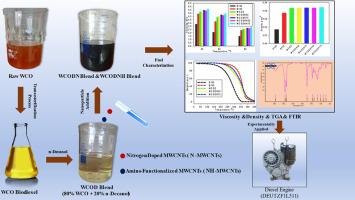Energy Conversion and Management ( IF 9.9 ) Pub Date : 2023-01-13 , DOI: 10.1016/j.enconman.2022.116646 Ahmed I. EL-Seesy , Mahmoud S. Waly , Hesham M. El-Batsh , Radwan M. El-Zoheiry

|
The depletion of fossil fuels makes it necessary to find alternative fuels to diesel. Waste cooking oil biodiesel (WCO) has interesting properties and could replace diesel fuel. However, WCO biodiesel increased nitrogen oxides (NOx) at high loads compared to diesel. Thus, some fuel additives, such as functionalized MWCNTs and decanol, can be used as they are considered promising diesel fuel additives and significantly affect engine performance and exhaust emission levels. The functionalized MWCNTs, mainly Nitrogen-doped multi-walled carbon nanotubes (N-MWCNTs) and amino-functionalized multi-walled carbon nanotubes (NH2-MWCNTs), are excellent catalysts that have been used recently in many applications and have good properties that can be used in diesel engines. Thus, in the current research, an experimental investigation was performed by a CI engine working at a constant speed and different loads to study the effects of a WCO biodiesel-decanol blend on engine performance and exhaust gas emissions. First, n-Decanol was added to WCO biodiesel to enhance the biodiesel combustion properties (80 % biodiesel + 20 % n-decanol by volume). Then, two doses (50 and 75 ppm) for each type of functionalized MWCNTs were inserted into the WCO biodiesel-decanol blend to enhance the engine performance. The results illustrated that WCO biodiesel-decanol blend was close to diesel in engine performance, where the NOx and soot were reduced by about 8 % and 20 % for WCO biodiesel-decanol blends compared to diesel. Also, the addition of functionalized MWCNTs led to a significant reduction in the NOx, CO, and soot levels by around 35 %, 61 %, and 44 % compared to diesel. BTE was diminished by almost 10 %, and BSFC was raised by 15 % for WCO biodiesel-decanol blend compared to diesel. At the same time, these negative impacts have been alleviated with inserting functionalized MWCNTs into the WCO biodiesel-decanol combination. At 75 % load, WCO biodiesel-decanol blends raised the in-cylinder pressure and advanced the start of combustion by a three-crank angle degree. Therefore, it can be implied that WCODNH75 is a recommended combination considering combustion and emission characteristics.
中文翻译:

使用正癸醇、氮掺杂和氨基功能化的多壁碳纳米管提高废食用油生物柴油在柴油机中的可用性
化石燃料的枯竭使得寻找柴油的替代燃料成为必要。废食用油生物柴油 (WCO) 具有有趣的特性,可以替代柴油燃料。然而,与柴油相比,WCO 生物柴油在高负荷下增加了氮氧化物 (NO x )。因此,可以使用一些燃料添加剂,例如功能化的多壁碳纳米管和癸醇,因为它们被认为是很有前途的柴油燃料添加剂,并且会显着影响发动机性能和废气排放水平。功能化的多壁碳纳米管,主要是氮掺杂多壁碳纳米管(N -MWCNTs)和氨基功能化的多壁碳纳米管(NH 2-MWCNTs) 是最近在许多应用中使用的优良催化剂,具有可用于柴油发动机的良好性能。因此,在当前的研究中,通过在恒定速度和不同负载下工作的 CI 发动机进行了实验研究,以研究 WCO 生物柴油-癸醇混合物对发动机性能和废气排放的影响。首先,将正癸醇添加到 WCO 生物柴油中以增强生物柴油的燃烧性能(80% 生物柴油 + 20%正癸醇(按体积计))。然后,将每种类型的功能化 MWCNT 的两种剂量(50 和 75 ppm)添加到 WCO 生物柴油-癸醇混合物中,以提高发动机性能。结果表明,WCO 生物柴油-癸醇混合物在发动机性能上接近柴油,其中 NO与柴油相比,WCO 生物柴油-癸醇混合物的x和烟灰分别减少了约 8% 和 20%。此外,与柴油相比,功能化 MWCNT 的添加导致 NOx 、 CO和烟尘水平显着降低约 35%、61% 和 44%。与柴油相比,WCO 生物柴油-癸醇混合物的 BTE 降低了近 10%,BSFC 提高了 15%。同时,通过将功能化 MWCNT 插入 WCO 生物柴油-癸醇组合中,这些负面影响得到了缓解。在 75% 的负荷下,WCO 生物柴油-癸醇混合物提高了缸内压力,并将燃烧开始时间提前了三个曲轴角度。因此,可以暗示 WCODNH75 是考虑燃烧和排放特性的推荐组合。











































 京公网安备 11010802027423号
京公网安备 11010802027423号